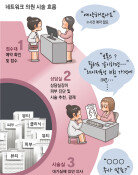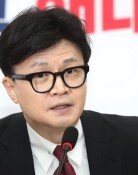[Editorial] Is this Systemic Personnel Management?
[Editorial] Is this Systemic Personnel Management?
Posted May. 24, 2004 22:10,
Prime Minister Goh Kun has made his intention clear once again that he will not practice his right of recommendation for the cabinet reshuffling. Though Chong Wa Dae is trying to persuade him to do so, the ambience has already become awkward. Even if the right of recommendation were to come into effect, both the president as the chief of personnel management, and the forcibly recommended cabinet members will not show off any authority as they look like they have solicited the leaving premier.
It seems that the commotion among the governmental service sectors caused by the delay of cabinet reshuffling will not be easily sorted out. It is a natural outcome of ones misdeeds. Who could be blamed while systemic personnel management has been emphasized with such intensity, but not been abided by? Chong Wa Dae has stated that The personnel management for the ministers should follow the steps that undergo the advice of a personnel recommendation committee, recommendation of the prime minister, and finally, the appointment of the president. They pointed out that they would not follow in, as a principle, the former regimes footsteps like the prime minister who just copies out while the president is calling the names of brand-new ministers. They should come through with what they have promised.
The reasons for reshuffling also seem unreasonable. Though it is an individual right of personnel management, there should be supportive reasons in terms of the personnel management of ministers. The presidential aide for personnel management, Jung Chan-yong has simply stated that in case of the ministers of Unification, Health and Welfare, and Culture and Tourism those which are being discussed as the targets of alteration, the reasons for making personnel changes have occurred, but he refused to mention anything as to the details of the reasons, only increasing curiosities around them.
If the reshuffling is carried out simply for granting an opportunity of joining the cabinet for executive figures of the leading party who performed meritorious deeds in the latest general election, or for allowing strong candidates for the next presidency to accumulate experience in national administration, the stableness of the governmental service sectors and efficient management of national administration cannot be expected in the near future. It is President Roh Moo-hyun himself who asserted that the ministers term of office should be at least two years. As the mischief has already taken place, President Roh should return to principle. Appointing candidates for the brand-new prime minister, the president should get a confirmation from the parliament and organize an atmosphere for the prime minister to practice his right of recommendation. That is the proper means to take. When the president sticks to exemplary basics and principles, the country will work in order.
Headline News
- Pres. Yoon addresses the nation at a press conference
- LX Group chairman gifts 100 million won to employee family welcoming quadruplets
- Tax-exempt shared offices in rural areas misused as tax havens
- President-Elect Trump promises 'peace through strength'
- French gambler wins 67.2 billion won by betting on Trump’s election win







